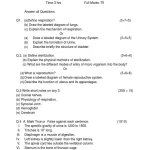Nursing is a profession rooted in compassion, science, and care. Preparing for GNM 3rd-year exams can be challenging but rewarding. This guide provides important questions and answers from 2019 to help students strengthen their understanding of all core subjects in the curriculum. It covers a variety of topics that are crucial for examination success.
Medical-Surgical Nursing III
Question: What are the key symptoms of myocardial infarction?
Answer: Chest pain, shortness of breath, nausea, sweating, and fatigue.
Question: Define hypertension and its classification.
Answer: Hypertension is elevated blood pressure. It is classified as primary or secondary hypertension.
Question: What are the nursing interventions for patients with COPD?
Answer: Monitor oxygen levels, promote breathing exercises, provide prescribed medications, and ensure patient comfort.
Question: Explain the role of insulin in diabetes management.
Answer: Insulin helps regulate blood sugar levels by facilitating glucose uptake into cells.
Question: What are the complications of kidney failure?
Answer: Electrolyte imbalance, fluid overload, anemia, and cardiovascular issues.
Question: Describe the post-operative care of a patient undergoing appendectomy.
Answer: Monitor vitals, prevent infection, manage pain, and encourage mobility.
Question: Explain the pathophysiology of asthma.
Answer: Asthma involves airway inflammation, increased mucus production, and bronchoconstriction.
Question: What is deep vein thrombosis (DVT)?
Answer: DVT is a blood clot in a deep vein, usually in the legs, causing pain and swelling.
Question: What are the causes of liver cirrhosis?
Answer: Alcohol abuse, viral hepatitis, and fatty liver disease.
Question: Discuss the nursing care plan for a patient with pneumonia.
Answer: Administer prescribed medications, monitor respiratory status, and ensure fluid intake.
Question: What is the difference between ischemic and hemorrhagic stroke?
Answer: Ischemic stroke occurs due to a blockage; hemorrhagic is caused by bleeding in the brain.
Question: Explain the treatment options for peptic ulcer disease.
Answer: Proton pump inhibitors, antibiotics for H. pylori, and lifestyle changes.
Question: What is diabetic ketoacidosis (DKA)?
Answer: DKA is a life-threatening condition due to insulin deficiency, causing high blood sugar and ketones.
Question: How is hypothyroidism diagnosed?
Answer: Through blood tests measuring TSH and T4 hormone levels.
Question: What are the signs of fluid overload?
Answer: Edema, high blood pressure, shortness of breath, and weight gain.
Question: Explain the stages of wound healing.
Answer: Inflammatory, proliferative, and maturation/remodeling stages.
Question: What is the importance of electrolyte balance in the body?
Answer: Electrolytes maintain nerve and muscle function, hydration, and acid-base balance.
Question: What are the causes of anemia?
Answer: Nutritional deficiencies, chronic diseases, and blood loss.
Question: How is hypertension managed through diet?
Answer: By reducing salt intake, consuming fruits and vegetables, and avoiding processed foods.
Child Health Nursing
Question: What are the signs of dehydration in children?
Answer: Dry mouth, sunken eyes, decreased urine output, and lethargy.
Question: What is the treatment for measles in children?
Answer: Symptomatic treatment, including antipyretics, hydration, and Vitamin A supplements.
Question: Explain the causes of neonatal jaundice.
Answer: Immature liver, hemolysis, or infection in newborns.
Question: What is the APGAR score?
Answer: A system to assess newborn health based on appearance, pulse, grimace, activity, and respiration.
Question: What are the signs of respiratory distress in a child?
Answer: Rapid breathing, flaring nostrils, grunting, and cyanosis.
Question: What is the nursing care for a child with diarrhea?
Answer: Rehydration therapy, monitoring electrolytes, and maintaining hygiene.
Question: What is congenital heart disease?
Answer: Structural defects in the heart present at birth.
Question: How is a febrile seizure managed?
Answer: Lower the fever with antipyretics, maintain airway patency, and provide supportive care.
Question: What is the role of vaccination in child health?
Answer: Prevents infectious diseases and promotes immunity.
Question: What are the symptoms of malnutrition in children?
Answer: Stunted growth, underweight, fatigue, and irritability.
Question: What is cerebral palsy?
Answer: A neurological disorder affecting movement and posture, caused by brain injury during development.
Question: How is pediatric asthma treated?
Answer: Bronchodilators, corticosteroids, and avoiding allergens.
Question: What is exclusive breastfeeding?
Answer: Feeding an infant only breast milk for the first six months.
Question: Explain the nursing care for a child with a cleft palate.
Answer: Feeding support, surgical preparation, and post-operative care.
Question: What are the causes of sudden infant death syndrome (SIDS)?
Answer: Unknown, but linked to sleeping position and environmental factors.
Question: What are the stages of growth and development in children?
Answer: Infancy, toddlerhood, preschool, school age, and adolescence.
Question: What is phototherapy in newborns?
Answer: A treatment using light to reduce bilirubin levels in jaundiced babies.
Question: How is pediatric fever managed?
Answer: Antipyretics, hydration, and monitoring temperature.
Question: What are the signs of vitamin D deficiency in children?
Answer: Rickets, delayed growth, and weak bones.
Community Health Nursing
Question: What is the importance of community health nursing?
Answer: Improves population health through prevention, education, and care.
Question: What is primary health care?
Answer: Basic, essential health care accessible to all individuals.
Question: What are the types of immunization schedules?
Answer: Routine, catch-up, and supplementary schedules.
Question: What is the role of a health worker in family planning?
Answer: Educates and guides couples on contraception and reproductive health.
Question: Explain the concept of health promotion.
Answer: Activities aimed at improving health and preventing disease.
Question: What are the causes of waterborne diseases?
Answer: Contaminated water, poor sanitation, and hygiene practices.
Question: What is the importance of handwashing in disease prevention?
Answer: Reduces the spread of infections by removing pathogens.
Question: What is malaria, and how is it transmitted?
Answer: A mosquito-borne disease caused by Plasmodium parasites.
Question: Explain the role of nutrition in community health.
Answer: Promotes overall health and prevents malnutrition-related diseases.
Question: What are the causes of maternal mortality?
Answer: Hemorrhage, infection, and unsafe abortions.
Question: What is herd immunity?
Answer: Indirect protection from infectious diseases due to high vaccination rates.
Question: How are communicable diseases controlled?
Answer: Isolation, vaccination, and public health interventions.
Question: What is the importance of antenatal care?
Answer: Ensures maternal and fetal health during pregnancy.
Question: What is the role of a nurse in school health programs?
Answer: Conducts health screenings, educates students, and manages minor illnesses.
Question: What are the benefits of breastfeeding for community health?
Answer: Reduces infant mortality and improves maternal-child bonding.
Question: Explain occupational health hazards.
Answer: Risks workers face, including physical, chemical, and ergonomic hazards.
Question: What is the importance of health education?
Answer: Empowers individuals to make informed health decisions.
Question: How is tuberculosis controlled in a community?
Answer: Through DOTS (Directly Observed Treatment Short Course), education, and vaccination.
Question: What are the types of waste management in hospitals?
Answer: Segregation, treatment, and disposal of biomedical waste.
GNM 3rd-year nursing questions from 2019 provide a comprehensive understanding of core topics like medical-surgical nursing, child health, and community health. By studying these questions and answers, students can enhance their knowledge and prepare effectively for exams. Focused preparation ensures success and strengthens practical nursing skills.
Latest Posts
- Step-by-step guide to download and apply for jee mains admit card 202
- Comprehensive 2025 government holidays and recruitment details for job seekers
- JEE Mains Admit Card 2025: Your Step-by-Step Guide to Downloading the Hall Ticket
- Everything You Need to Know About 2025 Government Holidays Recruitment
- Comprehensive Guide to rrb d group recruitment 2025 – Eligibility, Vacancies, and Application
- Detailed guide to nps trust recruitment 2025 vacancies, eligibility and apply process
- Comprehensive guide to hpcl recruitment 2025 notification, vacancies, and application process
- ignou bed admission 2025 complete recruitment guide with eligibility and process
- Comprehensive Guide to Indian Army Agniveer Recruitment 2025 Notification and Jobs
- Everything You Must Know About CBSE Board Exams 2025 Changes & New Rules



